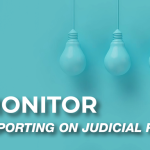26/2/2017 PUBLICATION “IMPLEMENTATION ANALYSIS OF THE RIGHT TO A TRIAL WITHIN A REASONABLE TIME ACT 2011-2015”
27/02/2017Models of deinstitutionalization and methods of protecting mental health in community
10/03/20175/3/2017 DRAFT CRIMINAL CODE AS A MISSED OPPORTUNITY FOR REFORM
The last position of the working group of the Ministry of Justice for amending the Criminal Code (CC) did not clarify what will be the final wording of the announced restriction on commenting court proceedings and prosecutorial investigations prior to a final verdict, which particularly alarmed the public, since the proposal was contrary to international standard of freedom of expression.
It is however clear that the majority of other proposals for reform of the Criminal Code vis-à-vis promotion of freedom of expression, protection of life and prohibition of torture were not adopted. HRA believes Montenegro has no time to delay reforms and that a more serious professional approach to such important issues is needed. Unfortunately, at this moment the Ministry of Justice refuses to take notice of the recommendations of the Committee against Torture and other relevant international organizations, and respond to serious risks to society in the form of the wave of killings, impunity for police torture and attacks on journalists, etc.
1) Numerous proposals of Human Rights Action were rejected, so the Criminal Code of Montenegro will apparently still encompass the following:
- Criminal offense Disclosing information about private and family life (Art. 197) – which is anachronistic, as it represents a form of insult and defamation, and is contrary to international human rights standards. This offense allows that a person who publicly discloses harmful information from one’s private life is not held responsible for such action, if disclosed information is proven to be true;
- Criminal offense Damaging the reputation of Montenegro (Art. 198) – providing for a prison sentence for “exposing to mockery” the state, coat of arms, flag and anthem, still exists despite the recommendations of international organizations for freedom of speech;
- Criminal offense Damaging the reputation of a foreign state or an international organization (Art. 200) – which envisages a fine of up to € 10,000 for mocking a state that Montenegro has diplomatic relations with or international organization that Montenegro is a member of. This absurd offense means that the European Union and NATO can still be “exposed to mockery” with impunity, but not the OSCE, Council of Europe and the UN.
2) It will still be possible to photograph and record without permission only those committing a criminal offense punishable by a jail sentence of five years or more. In other words, recording the commission of an offense punishable by a sentence of less than 5 years, e.g. police torture and other abuses by the officials punishable by a sentence milder than imprisonment of at least five years – will remain prohibited. Such protection of perpetrators of a large number of crimes is absurd as it prevents their identification, while punishing those who report them.
3) The proposal to remove time-bar for prosecution and execution of punishment for torture, murder and aggravated murder was rejected. This implies that murderers and torturers after 10, 15 or 25 years on the run cannot be punished. Absurdly, at the same time time-bar does not apply to crimes such as tax evasion, unlawful economic, banking, stock exchange or insurance activities, violation of equality in the conduct of business activities, abuse of monopolistic position, unauthorized use of another’s company, etc., which means that the perpetrators of these crimes can be held accountable for them a lifetime.
4) There will be no stricter punishment for ill-treatment, torture and extortion of confession, although this was strongly recommended – together with removing of time-bar for torture in Montenegro – by the Committee against Torture (CAT) and although the penalties imposed for these crimes in Montenegro are too mild, below minimum international standards.
5) The proposal for enhanced protection of journalists by prescribing new criminal offenses Preventing journalists in the performance of professional duties and Attack on journalists in the performance of professional duties, or by amending criminal offense Aggravated murder and Grievous bodily harm – was rejected on the grounds that there are other professions too that are at increased risk of attack, although the reports of the European Union on Montenegro as well as all other relevant reports on the situation of human rights in the country emphasize exclusively the problem of impunity of attacks on journalists.
6) Inmates will not be released from prison on parole if it is assessed that there are obstacles in terms of their safety – as a result, the purpose of deprivation of liberty also becomes compulsory protection of safety of prisoners, contrary to the Constitution and international standards, while introducing additional arbitrariness with regard to parole.







 English
English